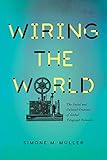Wiring the World : The Social and Cultural Creation of Global Telegraph Networks / Simone Müller.
Material type: TextSeries: Columbia Studies in International and Global HistoryPublisher: New York, NY : Columbia University Press, [2016]Copyright date: ©2016Description: 1 online resource (384 p.) : 10 figuresContent type:
TextSeries: Columbia Studies in International and Global HistoryPublisher: New York, NY : Columbia University Press, [2016]Copyright date: ©2016Description: 1 online resource (384 p.) : 10 figuresContent type: - 9780231174329
- 9780231540261
- 384.1 23
- HE7631 .M85 2016
- HE7631.M85 2016
- online - DeGruyter
- Issued also in print.
| Item type | Current library | Call number | URL | Status | Notes | Barcode | |
|---|---|---|---|---|---|---|---|
 eBook
eBook
|
Biblioteca "Angelicum" Pont. Univ. S.Tommaso d'Aquino Nuvola online | online - DeGruyter (Browse shelf(Opens below)) | Online access | Not for loan (Accesso limitato) | Accesso per gli utenti autorizzati / Access for authorized users | (dgr)9780231540261 |
Frontmatter -- CONTENTS -- ACKNOWLEDGMENTS -- Introduction: The Class of 1866 -- 1. Networking the Atlantic -- 2. The Battle for Cable Supremacy -- 3. The Imagined Globe -- 4. Weltcommunication -- 5. The Professionalization of the Telegraph Engineer -- 6. Cable Diplomacy and Imperial Control -- 7. The Wiring of the World -- Appendix: Actors of Globalization -- Notes -- Bibliography -- Index
restricted access online access with authorization star
http://purl.org/coar/access_right/c_16ec
The successful laying of a transatlantic cable in 1866 remade world communications. A message could travel across the ocean in minutes, shrinking the space between continents, cultures, and nations. An eclectic group of engineers, entrepreneurs, politicians, and media visionaries then developed this technology into a telecommunications system that spread a particular vision of civilization-but not everyone wanted to wire the world the same way. Wiring the World is a cultural and social history that explores how the large Anglo-American cable companies won out over alternative visions. Bitter rivalries emerged over telegram prices, visions for world peace, scientific innovation, and the role of the nation-state. Such struggles determined the growth of cable technology, which in turn influenced world history. Filled with fascinating characters and new insights into pivotal events, Wiring the World traces globalization's diverse paths and close ties to business and politics.
Issued also in print.
Mode of access: Internet via World Wide Web.
In English.
Description based on online resource; title from PDF title page (publisher's Web site, viewed 02. Mrz 2022)


